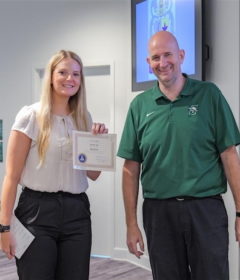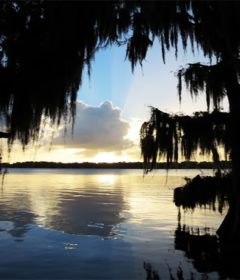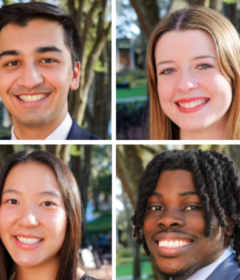Two Stetson Students Accepted Into Prestigious Economics Summer Institute
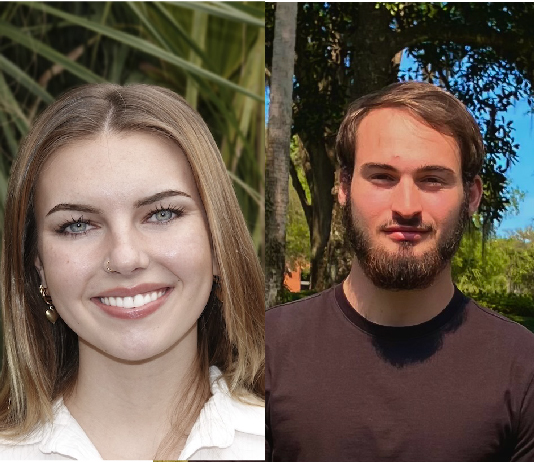
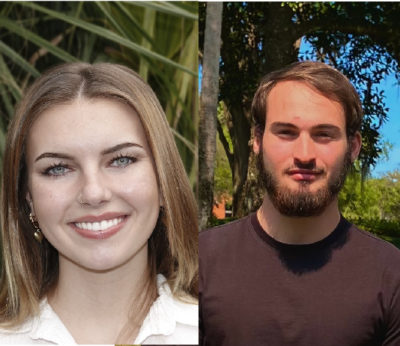
What are the odds? Apparently, quite good for Stetson.
There were nearly 1,000 student applications for entrance into the prestigious Expanding Diversity in Economics Summer Institute — of which only 45 nationwide were accepted. And two students from Stetson were accepted.
In mid-March, when the Becker Friedman Institute for Economics at The University of Chicago, in collaboration with the Hutchins Center on Fiscal and Monetary Policy at the Brookings Institution announced the 2024 cohort of the EDE Summer Institute, Abigail Radisky and Alex Faulkner — both Class of 2026 — were on the list.
Radisky is pursuing a double major in Digital Art and Marketing, with an interest in Economics. Faulkner is an Economics major.
About the Summer Institute
From June 6 to June 29, they will participate in two weeks of programming on the UChicago campus followed by one week in Washington, D.C., hosted by the Hutchins Center. The costs of housing, travel and participation are covered for all participants, who also receive a stipend of $1,200 ($2,400 for Pell-Grant-eligible students) upon successful completion of the program.
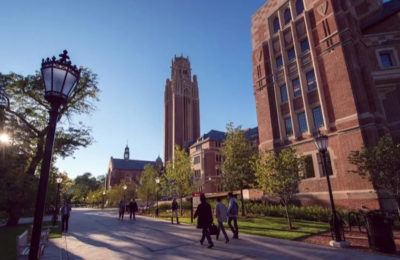
The EDE program was launched in 2021 and aims to increase diversity in economics through finding and supporting outstanding undergraduates who are interested in the field. The goal is to foster a “new generation of academics and professionals who draw on the tools of economics to offer new perspectives and research ideas, and eventually make a positive impact in the world,” according to Becker Friedman Institute officials. The program targets first- and second-year students. The 2024 cohort represents 33 universities in 17 states.
Among the universities represented are The University of Chicago, Standard University, University of Michigan, University of Virginia, University of Southern California, Swarthmore College and Duke University. And Stetson.
Cutting-Edge Analysis and Research
The Becker Friedman Institute serves as a hub for cutting-edge analysis and research across the entire University of Chicago economics community, cites Alan Green, PhD, Stetson associate professor and chair of the economics department (and also the Global Development Program director).
The late Gary Becker won the 1992 Nobel Prize in Economic Science. He was a professor at the UChicago. The late professor Milton Friedman received the 1976 Nobel Memorial Prize in Economics Sciences.
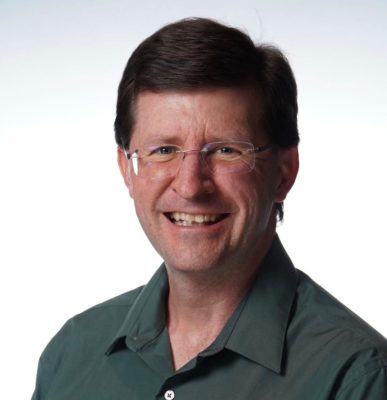
The Chicago-based programming will focus on microeconomic research and applied economic analysis, giving students a rare chance to participate in programs including technical skill building, daily course instruction from faculty, guest talks and field trips. In Washington, D.C., students are expected to engage in coursework and applied group projects, and learn from current and former government officials, private sector researchers, and early-career professionals.
“This is an effort from the field of economics to make sure that we’re providing opportunities for talented students from all over the country to be able to access the top minds in economics at the top schools,” Green said.
The two Stetson students, he asserted, are the results of impactful student-professor relationships and will fit right into the institute’s setting.
“Alex and Abby are fantastic students and they’re both really independent thinkers,” Green commented. “They’re both very thoughtful. They’re both capable of listening carefully and then formulating their own ideas.
“We’re teaching Friedman and Becker. We just went over that in one of our classes, and these are the names [students are] seeing, and now they’re going to go study at that institute. I can’t imagine the opportunity in Chicago!”
Green and others in Stetson’s Department of Economics were instrumental in ensuring their students’ participation. Green learned of the program at a conference.
“We’ve encouraged students to apply to various summer programs in the past. This is the first year we’ve applied to it — the first year we’ve pursued this opportunity,” Green said. “Our economics department really emphasizes doing research. … And we emphasize the methods, and we really push our students to get pretty close to master’s level methodology while they’re here. We think that prepares them really well for graduate school and those types of things.”
Enhancing Future Careers
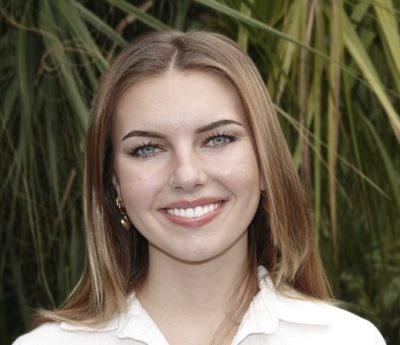
For Abigail Radisky, the EDE program will “equip me with an enhanced perspective on market dynamics, consumer behavior and fiscal policies,” she said.
Radisky aspires to work as a creative director at an advertising firm, combining skills in digital art and marketing — and expertise in economics. “I became interested in Economics when I took Foundations of Economics I with Dr. Green,” she said. “His interactive approach to Econ [using games and simulations to get all the students involved] made me understand the subject better, allowing me to enjoy it and want to explore it further. I ended up taking two more Economics classes taught by Dr. Green, just to learn more about the subject.
“During the [institute’s summer] program, I hope to expand my knowledge of economics, engage with the faculty members, and gain insights into current fiscal and monetary policies during the outings in the Washington, D.C., segment of the program. … This blend of creativity, marketing strategies and economic understanding could position me uniquely, enhancing my capacity to lead innovative projects that not only engage but also deliver measurable results. I see an interdisciplinary approach as critical for my career trajectory.”
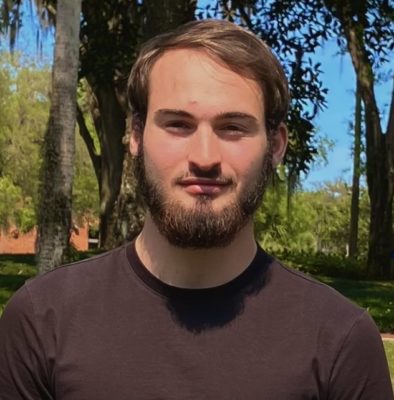
Alex Faulkner foresees working at a firm that can nurture the idea of employee satisfaction and push the idea that workers should have the opportunity to work in an environment that promotes a high quality of life. “I want to continue to develop the idea that blue-collar workers should be proud of their work and make a greater integration of their impact on our economy into general society,” he said. “I also want to continue to pursue my passion for learning foreign languages to connect with others on a global scale, while taking my professional life abroad in the future.”
“When hearing names such as Becker and Friedman associated with a school such as The University of Chicago, it’s difficult not to think about the impact that these names have had on our economies. But what sticks out to me more is the idea of Expanding Diversity in Economics. The idea of selecting a group of students who carry a passion for their studies and joining them together at an institute to share their realities would excite any ambitious student. With this opportunity, I will have the chance to learn, converse and spread ideas from other great minds who have the power to make progressive changes in our future economies.”
-Michael Candelaria

